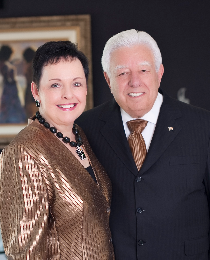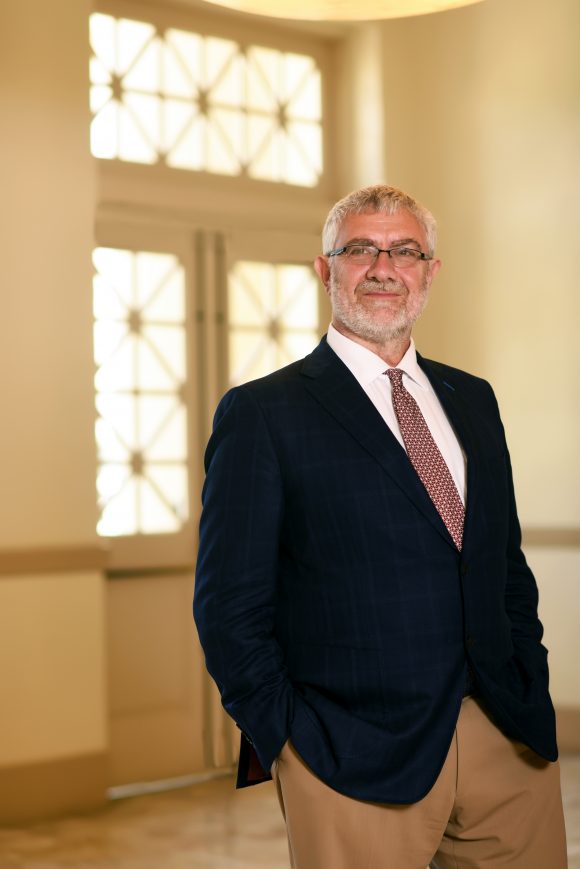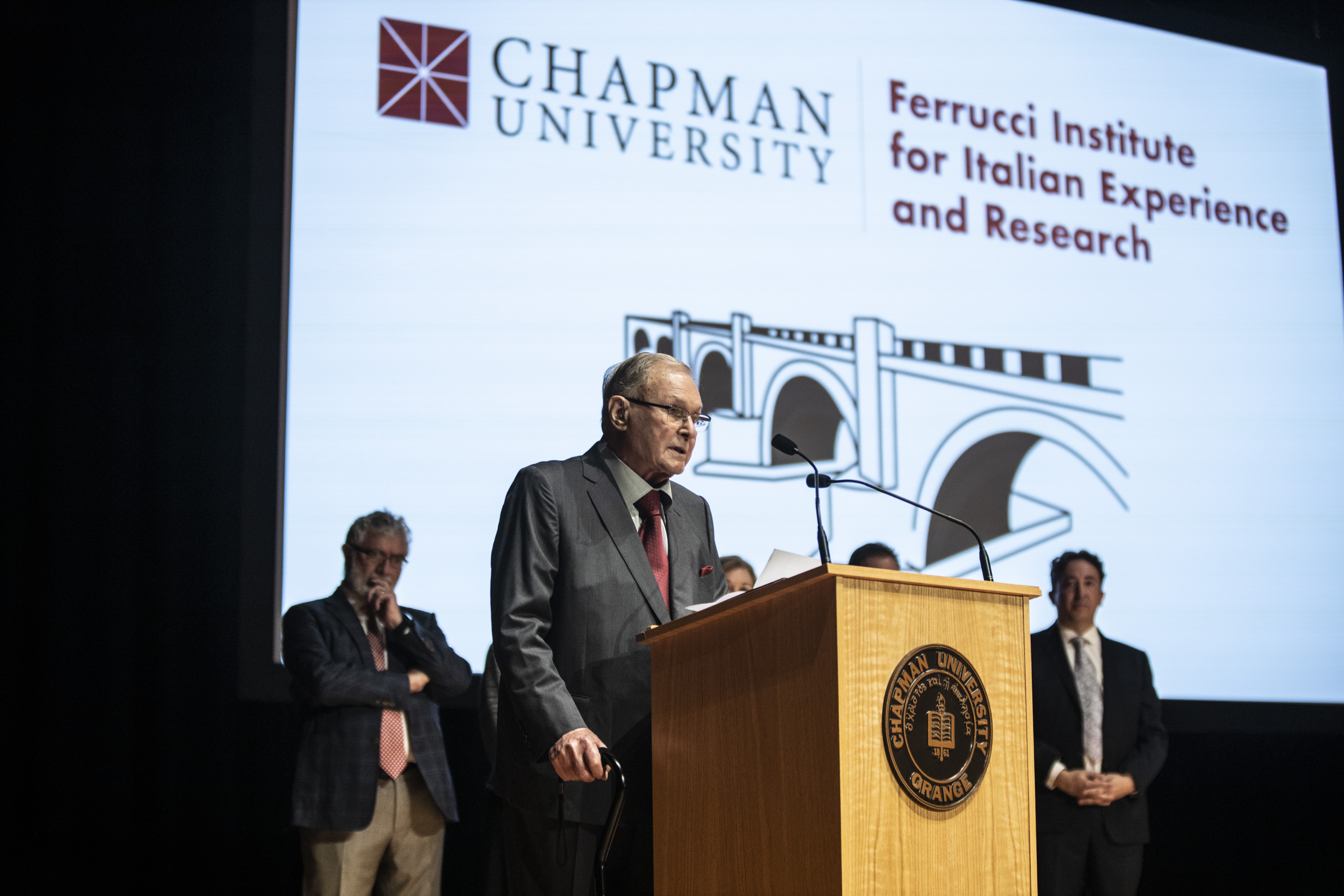The Ferrucci Institute is the fruit of a migrant legacy, the journey of generations to craft and embrace a unique role in a new society, and the statement of exemplary individual perseverance and dedication to education. The movement that has led to its creation and that now opens to new horizons and the building of new bridges is a growing cohesive force equally focused on  celebrating heritage and tradition and cultivating global awareness and new knowledge.
celebrating heritage and tradition and cultivating global awareness and new knowledge.
Italy has been a common ground for many faculty and students at Chapman, and it is also an important association for several leaders at the university, including President Daniele Struppa, President Emeritus Jim Doti, Trustees Jim Burra, Jim Mazzo, Paul and Marybelle Musco, and Don Sodaro.
The first foundational step was accomplished in 2007, when Paul Musco, a highly successful Siculo-American businessman from humble origins and world-renowned opera patron, created the Sebastian P. and Marybelle Musco Endowed Chair in Italian Studies with a $1M gift. Among the reasons that moved the Muscos to institute the new chair was the realization that Italian Studies was a missing link for artistic programs on campus, including voice performance. Indeed, the appreciation and performance of opera –a synergistic product of musical, literary, dramaturgic, and visual traditions –benefit greatly from preparation in Italian Studies.
Since 2012, under the guidance of professor Federico Pacchioni, the Musco Chair has served as an engine for the growth of Italian Studies’ footprint on and around campus. To honor the legacy of the Musco Chair, Italian Studies became a leading force on campus in fostering an appreciation for Italian culture by hosting artistic events and scholarly presentations open to the academic and local community. This activity attracted the interest of other local Italian Americans and Italophiles who began collaborating with the program under the umbrella of a new community board, the Italian Studies Council, first headed by a passionate community leader, Vicky Carabini, to whom, ten years later, the Italian government would bestow the honor of Knight of the Order of the Star of Italy for her service.
In 2017, the Italian Studies program began creating a series of travel courses in collaboration with Italian academic institutions to provide students with linguistic and cultural immersion and opportunities to create personal and professional bonds in Italy. Witnessing the ambition and impact of this new aspect of the program, the Muscos created, in 2018, a second $500K endowment (matched by the Board of Trustees from the undesignated endowment) to support student participation in Chapman's courses in Italy. This endowment has been ensuring that all deserving students can integrate an educational experience in Italy and inspiring new Italy-focused academic projects.
 The generosity of the Muscos and Dr. Pacchioni’s vision inspired Dr. Daniele C. Struppa, the 13th president of Chapman University and a proud Italian immigrant, to make, in 2021, a $1M legacy gift to establish a new endowed professorship at Chapman University, the Bernardino Telesio Professorship in Italian Studies. With his gift, Dr. Struppa ensured an even stronger future for the study of Italian at Chapman. Bernardino Telesio was a 16th-century philosopher from Calabria who revolutionized the understanding of knowledge with a method grounded in sensorial experience. Symbolically, the Telesio endowment solidifies the Italian program's value in a rigorous and passionate education beyond academic confines and in pursuing the unification of disciplinary knowledge. The Telesio Professorship is a homage to the humanistic roots that guide President Struppa in his work, and to the importance of international education; it is also a homage to the love that Italy often engenders in the human spirit for specific places, as for Calabria in the case of Struppa.
The generosity of the Muscos and Dr. Pacchioni’s vision inspired Dr. Daniele C. Struppa, the 13th president of Chapman University and a proud Italian immigrant, to make, in 2021, a $1M legacy gift to establish a new endowed professorship at Chapman University, the Bernardino Telesio Professorship in Italian Studies. With his gift, Dr. Struppa ensured an even stronger future for the study of Italian at Chapman. Bernardino Telesio was a 16th-century philosopher from Calabria who revolutionized the understanding of knowledge with a method grounded in sensorial experience. Symbolically, the Telesio endowment solidifies the Italian program's value in a rigorous and passionate education beyond academic confines and in pursuing the unification of disciplinary knowledge. The Telesio Professorship is a homage to the humanistic roots that guide President Struppa in his work, and to the importance of international education; it is also a homage to the love that Italy often engenders in the human spirit for specific places, as for Calabria in the case of Struppa.
The significance of these philanthropic investments attracted the attention of Gabriele Ferrucci, a successful retired businessman and beloved community leader, who was introduced to Chapman by Paul Musco and who was impressed by the Italian Perspective series. Mr. Ferrucci's success in the auto and then aerospace industries is an emblem of the strong work ethic he acquired from being raised in a farming village in the Neapolitan countryside and of his passion for education as a means to improving the mind –a goal for which he fought his entire life, especially when he emigrated to the U.S. with his wife Maria. Conscious of Italy's intellectual and cultural value and of the crucial role that the study and experience of the country have for students and faculty alike, the Ferrucci Family embraced the dream of creating a new Institute at Chapman University with a 1.5M naming gift.
Indeed, the collective effort underpinning the innovative quality of Italian Studies at Chapman is the expression of an Italian-American community capable of envisioning and creating its unique vital role in the education of future generations. New members of the community and philanthropic supporters are joining this beautiful legacy, now also through the Institute Leadership Board –the think tank that supports the Institute's strategic and network development. The board’s inaugural chairman, John Razzano, founded the Razzano Family Endowment for Italian Experience and Research.
Rooted in collaborative spirit and a new interdisciplinary humanistic paradigm, both inherent in the Italian ethos, the Ferrucci Institute is now spearheading Italian Studies in a new direction.
With Italian language and culture still at this core, new curricular and scholarly activities are energetically expanding across disciplinary areas and unveiling new connections beyond cultural and generational divides. The germinating effect of the idea of Italy embodied and nurtured by the Ferrucci Institute aspires to advance academics in surprising ways. Among its future developments, the Institute envisions creating a Chapman University Center in Italy, the other end of the bridge.